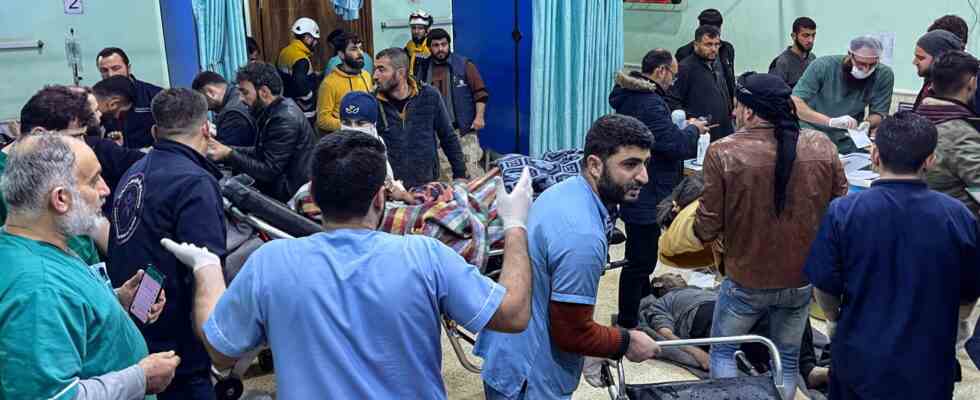As of: 02/08/2023 9:24 p.m
The rescue work in the Syrian part of the disaster area is making little progress. For example, because aid supplies can only get to the rebel areas via a single border crossing. It is unclear whether sanctions will further impede aid.
The UN has called on the Syrian government to allow aid workers access to the rebel-controlled earthquake zones in the north-west of the country. In Syria, the disaster area is divided into Damascus-controlled areas and rebel-controlled areas.
“Leave politics aside and let us do our humanitarian work,” the UN aid coordinator for Syria, El-Mostafa Benlamlih, appealed to the government of ruler Bashar al-Assad in an interview with the AFP news agency. “We cannot afford to wait and negotiate,” Benlamlih warned. “By the time we negotiate, it’s over, it’s done.” 2,662 deaths were recently reported from Syria.
Thousands missing in Syria
Civil war has been raging in Syria since 2011. Assad’s government now controls around two-thirds of the fragmented country again. Aid supplies that come into the country via the capital Damascus are distributed by Assad’s government. Again and again there are reports that the government enriches itself and ignores areas that it considers hostile. Thousands of people are still missing in the civil war country alone. There is a lack of equipment to clear debris.
The situation is particularly confusing in northern Syria. The Bab al-Hawa border crossing is the last of what were once four border crossings through which aid can also reach parts of Syria that are not controlled by the government.
In Bab al-Hawa, however, a damaged road had delayed the delivery of humanitarian aid. According to the World Health Organization (WHO), the road has now been repaired. In this way, the organization can supply the victims in northern Syria with emergency supplies from a warehouse in Turkey, said the WHO representative in Turkey, Batir Berdiklishev.
Yesterday, Federal Foreign Minister Annalena Baerbock called for all border crossings between Turkey and Syria to be opened in order to provide the civil war country with humanitarian aid.
Debate on the role of sanctions
It is unclear how obstructive sanctions against the Syrian regime are for aid deliveries. According to Malteser International, aid organizations are currently not able to enter Syria directly. The work must therefore be coordinated from Turkey. “We implement the aid for the people in north-western Syria through long-standing local partner organizations. They are responsible for distributing the relief supplies to the people affected,” said Oliver Hochedez, head of Malteser emergency aid.
The federal government said, however, that aid deliveries for Syria were not affected by sanctions. “The EU sanctions are not aimed at people in Syria, but at the regime and its supporters, profiteers of the war economy and people who are responsible for the most serious violations of human rights,” said a foreign ministry spokeswoman in Berlin. The sanctions only ban the import of a few goods. Food, heavy equipment for salvage and other humanitarian aid are excluded.
Human rights activist: Population is punished collectively
Peter Fuchs, managing director of the human rights organization Christian Solidarity International (CSI), on the other hand, considers the sanctions to be problematic. Bank transfers to and from Syria are impossible. “Syrians living in Germany or Canada can therefore not transfer money to their relatives in Aleppo, Hama or Latakia who have been made homeless by the earthquake,” the pastor pointed out.
No Syrian hospital can buy medical equipment, spare parts, medicines or generators abroad if it cannot pay for them by bank transfer. “The Syrian population has been punished collectively for years by the immoral sanctions regime of the EU and the USA,” Fuchs criticized.
Chancellor Olaf Scholz said in the Bundestag that Germany is delivering aid to Turkey and is in close contact with the United Nations to bring humanitarian aid to the Syrian earthquake area. The federal government is increasing its humanitarian aid for Syria and Turkey by a further 26 million euros. According to the Federal Foreign Office, a total of 25 million euros are earmarked for two United Nations aid funds and one million for the Maltese relief service.
Pope Francis also addressed the need in the Syrian regions in particular, “some of which have already been tortured by a long war”. The local population urgently needs help, emphasized the head of the church.
The Pope’s ambassador to Syria, Cardinal Mario Zenari, traveled to Aleppo to coordinate relief measures and is scheduled to discuss the situation after the earthquake and possible support with Catholic bishops and then with church leaders of other denominations that evening.

